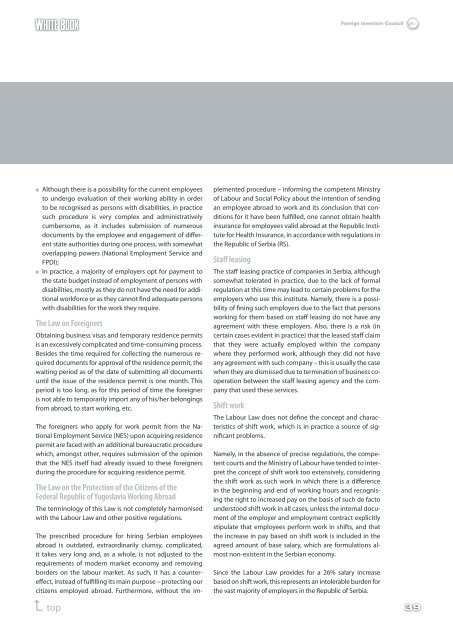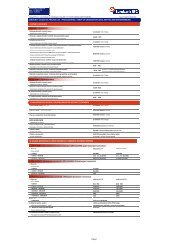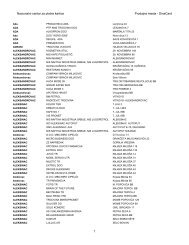Fic rEcommEndationS - Eurobank EFG
Fic rEcommEndationS - Eurobank EFG
Fic rEcommEndationS - Eurobank EFG
Create successful ePaper yourself
Turn your PDF publications into a flip-book with our unique Google optimized e-Paper software.
Although there is a possibility for the current employees<br />
to undergo evaluation of their working ability in order<br />
to be recognised as persons with disabilities, in practice<br />
such procedure is very complex and administratively<br />
cumbersome, as it includes submission of numerous<br />
documents by the employee and engagement of different<br />
state authorities during one process, with somewhat<br />
overlapping powers (National Employment Service and<br />
FPDI);<br />
In practice, a majority of employers opt for payment to<br />
the state budget instead of employment of persons with<br />
disabilities, mostly as they do not have the need for additional<br />
workforce or as they cannot find adequate persons<br />
with disabilities for the work they require.<br />
the Law on Foreigners<br />
Obtaining business visas and temporary residence permits<br />
is an excessively complicated and time-consuming process.<br />
Besides the time required for collecting the numerous required<br />
documents for approval of the residence permit, the<br />
waiting period as of the date of submitting all documents<br />
until the issue of the residence permit is one month. This<br />
period is too long, as for this period of time the foreigner<br />
is not able to temporarily import any of his/her belongings<br />
from abroad, to start working, etc.<br />
The foreigners who apply for work permit from the National<br />
Employment Service (NES) upon acquiring residence<br />
permit are faced with an additional bureaucratic procedure<br />
which, amongst other, requires submission of the opinion<br />
that the NES itself had already issued to these foreigners<br />
during the procedure for acquiring residence permit.<br />
the Law on the Protection of the citizens of the<br />
Federal republic of Yugoslavia Working abroad<br />
The terminology of this Law is not completely harmonised<br />
with the Labour Law and other positive regulations.<br />
The prescribed procedure for hiring Serbian employees<br />
abroad is outdated, extraordinarily clumsy, complicated,<br />
it takes very long and, as a whole, is not adjusted to the<br />
requirements of modern market economy and removing<br />
borders on the labour market. As such, it has a countereffect,<br />
instead of fulfilling its main purpose – protecting our<br />
citizens employed abroad. Furthermore, without the im-<br />
� top<br />
plemented procedure – informing the competent Ministry<br />
of Labour and Social Policy about the intention of sending<br />
an employee abroad to work and its conclusion that conditions<br />
for it have been fulfilled, one cannot obtain health<br />
insurance for employees valid abroad at the Republic Institute<br />
for Health Insurance, in accordance with regulations in<br />
the Republic of Serbia (RS).<br />
Staff leasing<br />
The staff leasing practice of companies in Serbia, although<br />
somewhat tolerated in practice, due to the lack of formal<br />
regulation at this time may lead to certain problems for the<br />
employers who use this institute. Namely, there is a possibility<br />
of fining such employers due to the fact that persons<br />
working for them based on staff leasing do not have any<br />
agreement with these employers. Also, there is a risk (in<br />
certain cases evident in practice) that the leased staff claim<br />
that they were actually employed within the company<br />
where they performed work, although they did not have<br />
any agreement with such company – this is usually the case<br />
when they are dismissed due to termination of business cooperation<br />
between the staff leasing agency and the company<br />
that used these services.<br />
Shift work<br />
The Labour Law does not define the concept and characteristics<br />
of shift work, which is in practice a source of significant<br />
problems.<br />
Namely, in the absence of precise regulations, the competent<br />
courts and the Ministry of Labour have tended to interpret<br />
the concept of shift work too extensively, considering<br />
the shift work as such work in which there is a difference<br />
in the beginning and end of working hours and recognising<br />
the right to increased pay on the basis of such de facto<br />
understood shift work in all cases, unless the internal document<br />
of the employer and employment contract explicitly<br />
stipulate that employees perform work in shifts, and that<br />
the increase in pay based on shift work is included in the<br />
agreed amount of base salary, which are formulations almost<br />
non-existent in the Serbian economy.<br />
Since the Labour Law provides for a 26% salary increase<br />
based on shift work, this represents an intolerable burden for<br />
the vast majority of employers in the Republic of Serbia.<br />
39




